John Janaro's Blog, page 127
March 31, 2020
Quarantine: "It's The Law" in Virginia (And All Over the World)
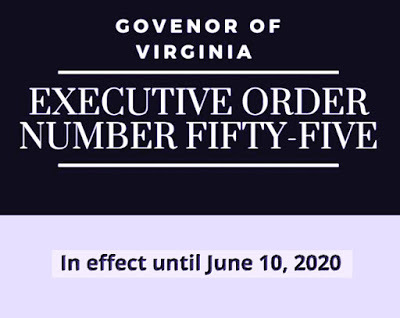 We have reached the end of what might be the most bizarre month of world-altering events that I have ever experienced.
We have reached the end of what might be the most bizarre month of world-altering events that I have ever experienced.Yesterday, the governor of the State of Virginia joined more than 30 other States in the United States of America in giving the force of law to what had been "guidelines" and "recommendations" to stay at home, and practice social distancing.
More than 80 percent of the population of the USA is now legally under constraints similar to the ones in Italy, most of Europe, and indeed most of the rest of the world. The evidence is clear that this is the best way to slow down the spread of the potentially serious respiratory infection known as COVID-19. This is a global pandemic of a very peculiar "new virus" that is highly contagious, that causes a relatively minor-to-moderate illness (including cases with few or no significantly discomforting symptoms) in the vast majority of people it infects, but can cause very grave illness requiring hospitalization in something like 15% of a population group. Numbers can be cold; we are talking about multitudes of people who will die or develop serious lung disabilities or at least require a long and difficult period of recovery from a disease that is transmitted to them by other infected members of the community who may not even know they have it. Such a chaotic phenomenon is obviously something that societies can't ignore (as has been demonstrated by the disasters in countries that did try to ignore it).
During the second half of March, the USA was forced into the position of trying to mitigate as much as possible the effects of a problem it neglected for too long, which is already multiplying prolifically, killing thousands of people, paralyzing the health care system in some major urban areas, and posing many unknown dangers. It is very hard to predict how things will unfold from here. Best-case projections are looking at 100,000 - 250,000 deaths in this country with many millions of serious illnesses requiring intensive medical care.
Obviously the numbers for victims worldwide are or will be exponentially higher. At this point, the only way to slow down (and eventually stop) this pandemic is for entire communities of people to "act as if" each member has the virus at least to the point of being possible communicators of the infection to others. In other words, everyone must observe at least some aspects of quarantine. As much as possible, we must stay at home, or practice "self distancing" when it is necessary to procure (or provide) essential services.
These are unprecedented restrictions, and we don't really know how long they will be necessary. But for now, they are necessary.
Perhaps this is all just a temporary "inconvenience" for the vast majority of us — an odd pause in our "normal" lifestyle of crisscrossing the Global Village unhindered, using our hyper-travel machines to move between and interact with various massive gatherings of bodily human beings, continually trafficking in millions of germs that our immune systems can handle.
Or perhaps it is the beginning of as yet unimaginable changes in how we relate to one another on a global and local scale. This is a possibility. All through my life, there have been people who have insisted — for various reasons — that such changes are inevitable and necessary, and that if we don't make these changes, events will force them upon us. I think they are pointing to something very real, which has to do with this elusive yet unmistakably emerging new epoch that I have been pondering in recent years.
We really are all interrelated and interconnected. We are all one human family. We are immersed within a delicate ecosystem. We are not submerged, so as to be merely a part of a larger system that takes precedence over our "species." We are human persons, with spiritual personal existence, intelligence, and freedom. Even as we transcend the physical universe, we also "belong" in it as its apex and crown. Here we mature and fulfill our vocation. The world has been entrusted to our care — not to abuse as meaningless stuff to be pillaged and destroyed in pursuit of our endless violent cravings, but to receive as a gift that can provide adequately for our physical needs, and a place we engage with wisdom and gratitude, cultivating spaces of habitation that peoples call "home," where human persons live in communion with one another and with gentle, organic solicitude for all the natural world and the beauty and diversity of its creatures.
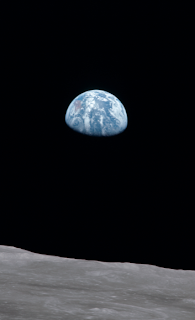 I remember when we saw Earth on TVWe have not been doing this very well. For all of our dazzling material achievements, we have too often used our power recklessly. We use our power over the world and over our own bodies for many good things, but also (and too often) to build gigantic edifices and systems in the service of our titanic illusions.
I remember when we saw Earth on TVWe have not been doing this very well. For all of our dazzling material achievements, we have too often used our power recklessly. We use our power over the world and over our own bodies for many good things, but also (and too often) to build gigantic edifices and systems in the service of our titanic illusions.Though our delusions and ambitions are limitless, nature is not. A culture of power-without-wisdom is fundamentally unsustainable. We must change the way we live, or else change will be forced upon us.
Here I confess to my own weakness: I do not like change very much.
I have lived my life in a historical period of seismic changes. I haven't weathered the stress of change very well. I have endured the earthquakes by somehow managing to fall into the cracks where survival and even some ingenuity remain possible. They have served in part to provoke me to those deeper changes that are essential to growing and moving forward in the journey of being a human person. I seem to be very slow to change. I know that I prefer to change slowly!
I don't know how to live during the COVID-19 Pandemic of 2020 except one day at a time. It has not (at least, not yet) created too many external changes to my rhythm of life. I have been "staying at home" for a long time. What is interesting is that the rest of the world seems to have joined me, and everyone is avidly (perhaps desperately) using the powers of communications technology to make up for what they are missing by being deprived of the freedom to move about with transportation technology.
For now, it has made social media a more genuinely "social," more aware, more creative, more human place. People are discovering that the "digital continent" does exist, that it is more than a means of narcissistic indulgence, haphazard interaction, and invasive curiosity. It is a means of human communication. It also has limits. Recognizing its relative utility and its limits may help us build up constructive facets of media that will endure beyond this crisis.
Presently, the crisis is still unfolding. What will happen? I don't know.
Are we all going to DIE?
The answer to that question is "YES."
But it is also likely that most of us will not die from the COVID-19 infection. Some will die from it, and others will feel the impact of losing loved ones. We must care for the sick and suffering among us, and stand with compassion and solidarity with those who endure loss from this pandemic and other disasters. But we will all die... eventually. We don't need to be unreasonably morbid or terrified, but the disruptive and disorienting experience of this pandemic can serve as a signal to us of our mortality, and the need to prepare for that final, defining moment.
Being a foolish human being, of course, it's only natural for me to speculate about how this will play out. Obviously we are all taking responsibility for limiting our activity in order to facilitate the end of the pandemic and the prevention of it returning in the future. So we all reasonably hope for that.
My "speculation" for my own country is that probably this is going to be (for those who are not directly or proximately hit by the affliction itself or its economic and social consequences) a temporary-and-very-strange-period-of-time that will be followed by a season of economic hardship. It will be especially difficult for the poor. In the long run it will yield some small readjustments to human living that most of us will not notice too much in our lifetimes. Maybe there will be some advances in medical science (and our health care system as a whole) corresponding to the needs that this pandemic has revealed to us. Maybe we will even see some of the advantages of "slowing down a bit" and simplifying our lives, focusing on what really matters.
Maybe.
Maybe some of the impressions people are now having about how we are all united as one human family will bring about some good — something that lasts beyond the intensity of sentiments that current circumstances are generating; we all know that sentiments will not last on their own strength.
Maybe we can choose to make some changes for the better in our attitudes as well as our behavior. Maybe we will remember to be less presumptuous about how much we control reality. Maybe we will learn that being reasonable and responsible human persons does not conflict with being open to the ultimate mystery of life. When the reality of life's mystery confronts us, as it has in these days, we remember our humanity, we turn our hearts to one another, we discover in ourselves surprising resources of real practical energy, creativity, courage, and compassion.
Published on March 31, 2020 18:01
March 29, 2020
"...With You is Forgiveness"

"If you, O Lord, mark iniquities,
Lord, who can stand?
But with you is forgiveness,
that you may be revered.
I trust in the Lord;
my soul trusts in his word....
For with the Lord is kindness
and with him is plenteous redemption."
~Psalm 130:3-5, 7
Published on March 29, 2020 20:10
March 28, 2020
The World is His Parish
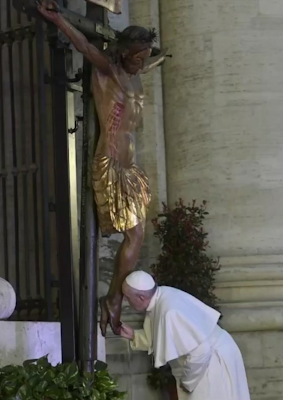 The streets of Rome are empty these days.
The streets of Rome are empty these days.Italians are doing their best to persevere against the COVID-19 epidemic, spending most of March quarantined in their homes. Similar measures are being taken in many parts of the world. Public gatherings are canceled. Gatherings for religious services have been curtailed or suspended on their own initiative.
The Catholic Church in Italy (and many other places, including dioceses in the USA) has gone beyond dispensing people from their Sunday Mass obligation. Masses are not even being offered with large public congregations. Priests still offer Mass every day, but in empty churches... or, at least, churches without physically present parishioners. What they have are videocameras that bring livestreamimg Masses to unprecedented numbers of "virtual participants," who unite themselves in spirit and heart with Christ's Paschal Mystery which remains the center of the Church's life through the ministerial priesthood.
One 83-year-old priest has a worldwide congregation as he says Mass every morning with his small staff in the chapel at his residence in Rome. Pope Francis from his own place of quarantine is proving more than ever to be the world's pastor. In addition to his daily Masses and Wednesday Audiences, the Pope has led several gestures of prayer for an end to the pandemic. Yesterday's event was especially moving.
With the world "connected" through Vatican Media, Pope Francis preached in an empty St Peter's Square, venerated a large crucifix, prayed to the Virgin Mary, and then held adoration and benediction of the Blessed Sacrament with a special blessing "Urbi et Orbi" (usually given only at Christmas and Easter), "to the 'city' (of Rome) and the world."
At the beginning of this service, the Pope was seen walking through the middle of the large square, alone, with rain pouring down on him. By the end he was visibly limping, no doubt from the sciatica that pains him, as he carried the monstrance with the Blessed Sacrament.
I am so grateful for this 83-year-old man, with part of one lung missing, who is in the highest of the "high-risk categories" for dying if he were to be infected by the coronavirus. His courage is not a surprise: Francis has never made any effort to preserve his life. Since becoming Pope, he has seemed continually ready to offer it.
Now his witness grows greater. In this singular crisis, he is pouring out his life for his flock, and to make the closeness and tenderness of Jesus known to all the world.
It gives great authority to his words, which are worth pondering in their entirety, and so I present them here from Vatican News (below or click this LINK to Vatican News website):

Published on March 28, 2020 20:30
March 27, 2020
March 26, 2020
Lent Becomes More Concrete, More Meaningful For Us
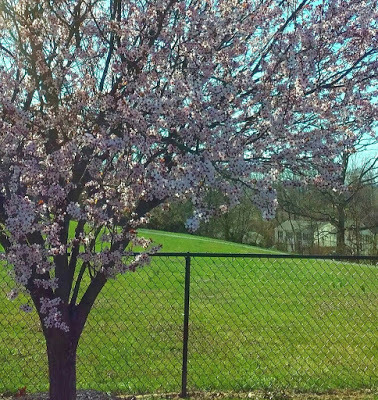 Picture from Greenfield in Strasburg, late March 2019The coronavirus pandemic "shutdown" will no doubt have many long term consequences (one of which, we hope, will be the control and eventual eradication of the infection). At the moment, in the midst of Lent, it touches all of us in one way or another. It's a particularly difficult "penance" for those who are sick and their caregivers. For many others, the economic implications are already a source of present suffering. Basic features of our way of life — that we have taken for granted for generations — may not be the same in the future. The past month has taught us that even tomorrow is unpredictable.
Picture from Greenfield in Strasburg, late March 2019The coronavirus pandemic "shutdown" will no doubt have many long term consequences (one of which, we hope, will be the control and eventual eradication of the infection). At the moment, in the midst of Lent, it touches all of us in one way or another. It's a particularly difficult "penance" for those who are sick and their caregivers. For many others, the economic implications are already a source of present suffering. Basic features of our way of life — that we have taken for granted for generations — may not be the same in the future. The past month has taught us that even tomorrow is unpredictable.For people all over the world, the immediate impact has been a more or less vigorous quarantine, which involves various limitations and changes in the routines of daily life. We can live these days with a greater awareness of the gratuitousness of existence. This reality that is "life" is inexplicable and utterly fragile if we consider it to be "closed-in-on-itself," as constituted entirely within the limits of what we can materially measure and predict. Only insofar as we trust in God can we realize our inherent dignity and aspirations for life's enduring meaning.
This is a fitting source of meditation for the season. It is also a difficult one. For our family, the past three Lents have been full of experiences of sudden change, illness, unpredictability, and the urgently felt need to depend on God.
Two years ago at this time, we were in the process of moving my Dad out near us after he collapsed, and experienced the sudden and frightening onset of severe dementia. One year ago, we were keeping vigil at his bedside as he lay dying. He passed away on April 3.
This Spring is something else all together. I miss my Dad. That would have been true in any case, but in the present circumstances my heart goes out to people who are losing beloved elders (who are most susceptible to fatality from COVID-19). The lives of our elders are precious, beyond any quantitative calculus.
One of the hardest things about our sheltering-in-place is that we are in the Shenandoah Valley while Mom is still at the Assisted Living facility in Arlington (this remains a temporary transitional arrangement, but the plan for her and us to move to a bigger house out here and all live together is — needless to say — on hold for the present). Mom's facility is strictly closed to visitors, so we can’t see her right now, but thank God she’s well-cared-for and we can talk on the phone. They’re taking all necessary measures and precautions. Mom is very frail, but lucid and in good spirits — all things considered.
Of course, it's not possible to predict or guarantee anything. We can only do our best to follow the proposals of prudence and those who have authority to attend to the common good. Beyond that, however, we have hope, with confidence that the infinite wisdom and goodness of God holds us all in his love. In Jesus, the reality of God's love embraces every aspect of our humanity. In our sorrows we discover more and more that Jesus is the central reality of our lives.
It has been hard in recent years. But Lent and Easter have become more concrete, more meaningful to us as the vital ecclesial "memorial" of the events of salvation that correspond to the questions, the needs, and the suffering of our own specific lives.
Published on March 26, 2020 18:18
March 25, 2020
The Beginning of Everything

Mary said, “Behold, I am the handmaid of the Lord.May it be done to me according to your word" (Luke 1:38).
Published on March 25, 2020 15:30
March 24, 2020
Saint Oscar Romero: Transfigured in Eternity
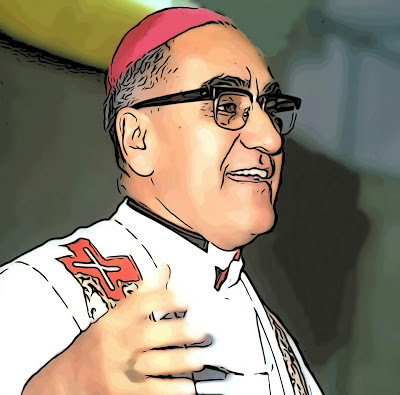 On this evening forty years ago, Archbishop Oscar Romero was martyred at the altar while celebrating Mass in San Salvador. His heroism in life and in death is now universally acknowledged by the Catholic Church that canonized him in 2018. Romero's prophetic legacy has proven both perceptive of his own time (with his integrally Christian and human vision of "liberation" as transformation in Christ) and rich with meaning for today's very different circumstances.
On this evening forty years ago, Archbishop Oscar Romero was martyred at the altar while celebrating Mass in San Salvador. His heroism in life and in death is now universally acknowledged by the Catholic Church that canonized him in 2018. Romero's prophetic legacy has proven both perceptive of his own time (with his integrally Christian and human vision of "liberation" as transformation in Christ) and rich with meaning for today's very different circumstances.The Cold War that seemed to define so many Third World political liberation movements in Marxist-Leninist terms has long ended. The ideology of dialectical materialism with its utopian collectivist dream has been jettisoned by power seekers. In its place we have a broad spectrum of secularist political tribes and criminal organizations that occasionally try to cover themselves over with intellectual justification but are largely focused on controlling societies to serve their ambitions, greed, or other peculiar vices. Of course, there are also those who are dedicated to building a genuine political order in the service of justice and the common good.
El Salvador has endured a horrible civil war followed by a series of unstable regimes. The poor are still poor, threatened now by gangs, cartels, and all sorts of anarchic violence in a region still lacking an equitable relationship with its titanic northern neighbor.
Now the year 2020 is giving all of us a taste of the fact that our sense of control over reality is something of an illusion. Our economic and social power is not as secure as we thought. The dynamics of global interconnection has opened up new kinds of vulnerability, and the fragility of nature itself increasingly protests our presumptions of unlimited increase of material wealth.
What is the hope of society? The gospel shines its light all through history - a light that illuminates life in this world even as we journey toward the fulfillment of eternal life. As Christians, we know that Jesus Christ is the source of all our hope. Everything belongs to the Risen Christ. We are called to reflect the light of his reign in every part of this world, even in the building up of temporal societies and the identities of peoples. But we work within the world in the freedom of Christ, not with worldly violence. Our politics does not attempt to impose the gospel; rather we are stirred by the hope that the gospel awakens in us of the transcendent Kingdom of God (which encompasses the transfiguration of all the goodness and all the meaningful work of history in Jesus's glorified humanity). By the light of loving faith and hope, Christians can engage society with a politics shaped by justice, equity, compassion, and mercy.
I believe that this is what Saint Oscar Romero preached. This is the heart of his prophetic witness, from which we still have much to learn.
Excerpts from Romero's homily of Sunday, March 2, 1980:
"The plan of God has to prevail over all human plans if these plans want to be truly human plans and not anti-human plans. The Church always has before her eyes the human person. This is the star that guides the Church’s journey, a journey that is often misunderstood and at times slandered because many people want their temporal plans to prevail.
"Yet for the Church, the human person is that which is most important: the human person, a child of God. It is for this reason that we are pained when we find dead bodies, men and women who have been tortured, men and women who suffer. For the Church the goal of all plans has to reflect the plan of God which is focused on the human person. Every man and woman is a child of God and in each person that is killed we find Christ sacrificed and for this reason we also venerate our martyrs....
"This is how God desires to find people: freed from sin and death and hell, living the gift of his eternal life, immortal, and glorious. This is our destiny and so as we talk about heaven we are not speaking of some form of alienation but talk in this way in order to motivate people to work with more energy and joy and to accept their great responsibility toward the world.
"No one works on this earth and on behalf of the political liberation of people with more enthusiasm than those who hope that the liberating struggles of history become incorporated into the great liberation of Christ. We must come to the understanding (as the Council states) that everything that we sow in this world, for example, justice and peace, and calling people to use common sense, all of this we will be transfigured in the beauty of our eternal reward....
"Saint Paul..places in opposition the followers of Christ and the enemies of the cross of Christ who only seek worldly benefits, who only aspire to worldly things. 'Their god is in their stomach and their glory is their shame.' Saint Paul uses these harsh words in order to declassify those plans of history that only seek temporal goods and then present the great plan of God who desires to incarnate in the plans of the earth his great divine plan.
"God is telling us that from the perspective of the resurrection Christians are inhabitants of eternity and thus they journey on this planet and work on this earth because they have to give an accounting to God, but their definitive land is where Christ lives forever, where we will be happy with him, the great liberator of freed people. The people who are freed will be those who have made their own that which Saint Paul calls the power that enables them to use the energy that they possess [in Christ] and that enables them to submit everything to God....
"My sisters and brothers, we are not weak when we speak as Christians about our faith in Christ. No one has the power of a Christian who has faith in Christ who lives and is the power of God. What leader of humanity is able to tell his followers that he lives forever? What victorious person in the world can point out to all the world the great victory of his death and resurrection? These are not false considerations but the fundamental reality of our Christian faith. Christ has risen and death no longer has dominion over him.
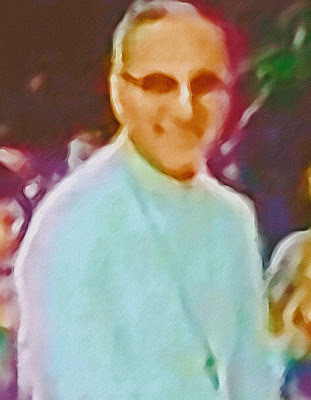 "The destiny of the risen Lord is to subject all of this to his kingdom so that one day he is able to hand over to God the universal kingdom, the kingdom of women and men, the kingdom of history where even his enemies appear to be chained beneath the power of Christ who has overcome death forever. Jesus has said that this is our faith that overcomes the world and for this reason the plan of God can rely on the greatest power...
"The destiny of the risen Lord is to subject all of this to his kingdom so that one day he is able to hand over to God the universal kingdom, the kingdom of women and men, the kingdom of history where even his enemies appear to be chained beneath the power of Christ who has overcome death forever. Jesus has said that this is our faith that overcomes the world and for this reason the plan of God can rely on the greatest power...
"The theology of the transfiguration is telling us that the path of redemption must first pass through the cross and Calvary but beyond history lies the goal of Christians. This does not mean that we become alienated from history but rather that we give a more profound meaning, a definitive meaning to history. From the time that Christ rose from the dead the torch of eternity remained hidden in the history of time. From the time that Christ rose in history people have retold this story to encourage people and make people aware of the fact that Christ lives and those who work with him will live forever.
"From the time that Christ rose and was transfigured for all people in history, Christ is saying to all his followers: 'whoever believes in me, even if they die, will live.' This same Christ had encouraged Saint Paul when he..told the Christians community: 'Our citizenship is in heaven, and from it we also await a savior, the Lord Jesus Christ. He will change our lowly body to conform with his glorified body by the power that enables him also to bring all thing into subjection to himself'....
"My sisters and brothers, let us not lose sight of the transcendence of the Christian message no matter how great our concerns or our responsibilities in the struggles of people. Let us not be content with immanent energy but let us also realize the need for transcendence. I would like to see many politicians and young people and women and men organizing themselves but I would like to see this being done with a profound Christian meaning. May these same people bring this witness of transcendence to the process of our people because more than ever before our people need this Christian witness.
"For this reason those involved in the liberating process of our Salvadoran nation can be assured that the Church will not abandon them but will continue to accompany people in this process. The Church will do this with the authentic voice of the gospel, the voice of transcendence and the voice of Jesus. The Church will continue to demand of all liberators that if they want to be strong and effective then they must place their trust in the great liberator Jesus Christ, and must not separate themselves from him for any reason."
Published on March 24, 2020 15:14
March 23, 2020
Rejoice in the Lord
The Fourth Sunday of Lent is "Laetare Sunday," and we are invited with vibrant roses to "rejoice" as our Lenten journey progresses. In the midst of many difficulties this year, we can still find reason to "rejoice," because the Lord accompanies us through everything.


Published on March 23, 2020 00:03
March 21, 2020
"The Passing of Our Holy Father Saint Benedict"
 March 21 used to be Saint Benedict's feast on the Roman calendar, but it continues to be observed (along with numerous other days, including July 11) by the Benedictine tradition.
March 21 used to be Saint Benedict's feast on the Roman calendar, but it continues to be observed (along with numerous other days, including July 11) by the Benedictine tradition.It commemorates his death and entrance into eternal glory, and remains a solemnity on the particular Benedictine calendar. (Pictured here is the image of Saint Benedict from a Rosary of the CL Fraternity.) Happy Feast of "The Passing of Our Holy Father, Saint Benedict" to all Benedictines monks and nuns, all those in the Benedictine tradition, all oblates, all members of the Benedictine family (which in the broad sense includes the members of the Fraternity of Communion and Liberation), and to all who follow the 1962 calendar.
God bless all Benedictines and Cistercians and all who follow the Rule.
Holy Father Saint Benedict, pray for all of us especially in these times of pandemic, and watch over the sick, those who care for them, and the overall needs of our societies. Protect us from every evil, and turn our hearts toward one another in the midst of our present difficulties.
Help us as we "pray and work," that we might "love Christ over all things," and "never despair of the mercy of God."
Published on March 21, 2020 19:17
March 20, 2020
SPRING Has Not Been Cancelled
Published on March 20, 2020 09:52




